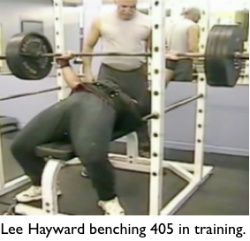The whole topic of “Overtraining” is surrounded by myths and misconceptions in bodybuilding circles. Some fitness gurus believe that virtually everyone is overtraining, and then some other fitness gurus believe it’s impossible to overtrain… Obviously, the truth of the matter lies somewhere in between these two extremes.
According to Wikipedia they define Overtraining as:
Overtraining is a physical, behavioral and emotional condition that occurs when the volume and intensity of an individual’s exercise exceeds their recovery capacity. They cease making progress, and can even begin to lose strength and fitness. Overtraining is a common problem in weight training, but it can also be experienced by runners and other athletes.
I think that definition of overtraining is pretty darn accurate.
The big problem I find with most of my coaching students and website followers is they pretty much “know” what overtraining is, but they can’t really tell if they are overtraining in their own workouts or not.
The root of all this confusion comes from the fact that what is overtraining for one person, is not necessarily going to be overtraining for another person. We all have different levels of fitness, different levels of work capacity, and different recovery rates. Not only that, but all of these factors will change within the individual as they get more experienced with their workouts and get in better physical shape.
A common e-mail that I get at least a dozen times a day is one of my followers will send me a copy of their workout routine that they are following and then ask me:
“Am I Overtraining or Is My Routine Ok?”
Are You Overtraining? Click PLAY To Find Out…
Note: if you are on an iPad and can’t watch the embedded video clip above,
you can watch it right on my YouTube Channel by Clicking Here
And you know what I CAN’T accurately answer that question. Anything I say will only be an educated guess. Only YOU can truly tell if you are overtraining or not by monitoring your progress (or hiring a coach who is going to monitor your progress for you).
But I’ll give you some guidelines here within this article that you can use to help monitor your progress. This will allow you to decide for yourself if you are overtraining and if you should make changes to your workout routine, or if you can keep on doing what you are doing.
=======================
1. Strength Gains
Are you making strength gains with your workouts? You should strive to constantly improve your strength on a regular basis by either getting an extra rep on your sets, or adding an extra 5 pounds to the bar.
This is what we refer to as “progressive overload”. Now obviously it’s not alway going to happen each and every workout, but you should be seeing some noticeable progress in your strength as the weeks go by, especially if you have been tracking your workouts in a log book.
For your major lifts like bench presses, squats, deadlifts, rows, leg presses, etc. it should be fairly easy to make 5 pound jumps in weight on a regular basis. For the smaller isolation type of exercises like bicep curls, lateral raises, flyes, etc. the gains will come slower. After all there is a BIG difference between adding 5 pounds to a 200 pound squat compared to adding 5 pounds to a 20 pound dumbbell curl.
So right now do a quick self evaluation…
Have you been making steady strength gains over the past several weeks? Have you been able to set some new personal records with your major compound lifts? If so then chances are you are NOT overtraining.
However, if you have been lifting the same weights for months on end, or even worse you had to reduce some of your poundages on certain lifts, then you may very well be overtraining.
Gaining strength is one of the most easy to measure signs of progress with your workouts. And if you are not moving forwards, then you are moving backwards, it’s as simple as that.
=======================
2. Changes In Bodyweight
Another measurable way to monitor your progress is by keeping track of your bodyweight. Any unexplained changes in your bodyweight could be a sign of overtraining.
For example, if you are currently training to gain muscular size and bulk and you are hitting the gym hard and consistently. But you find that your weight is actually going down, when it should be going up, then you may very well be overtraining.
On the other side of the coin, if you are training for fat loss and you are following a very strict diet, doing regular cardio, and hitting the gym consistently. But you are still not losing any weight, or worse you are even gaining weight. Then this maybe a sign that you are overtraining.
You see your body has to be coaxed into making progress, you can’t force it. When you try to force your body to change it sometimes backfires and does the opposite of what you want. And one of the ways it does this is through unexpected weight changes.
A prime example of this is with a lot of overweight people who try and diet themselves skinny. Have you ever known someone who went on a borderline starvation diet or maybe even cut back to eating just one meal a day in effort to lose weight?
What usually happens is that their body basically says “F-ck You” and it ends up clinging to all the stored bodyfat for fuel, while burning up precious lean muscle tissue in effort to slow their metabolism down. It does the exact opposite of what the dieter is trying to accomplish. In fact they may actually gain fat in this calorie deprived state.
Some words of advice that you should follow when trying to change your body, be that gaining muscle or losing fat, is that most people “over estimate” how hard improving their physique will be… But they “under estimate” how long it will take…
Bottom line, you don’t have to force yourself, torture yourself, or any such thing. You just have to be consistent with the basics over the long term in order to get the results you want.
=======================
3. Energy & Motivation
The first 2 guidelines are concrete and measurable. Meaning they are actual numbers that anyone can monitor and instantly see if there is any change or not. But this 3rd guideline is more subjective and you have to be extra cautious when monitoring subjective things because human error and inexperience can really screw things up.
If you have been training hard and consistent for weeks or months on end and then all of a sudden you find that your strength, energy, and motivation for your workouts start to drop then this is very likely a sign of overtraining and it’s your body’s way of telling you that you need a rest.
But the problem here comes with less experienced fitness enthusiasts who often times mistake lack of motivation from plain old laziness as “overtraining” and then they may end up backing off with their training, when in fact they need to do the exact opposite and kick themselves in the butt and push it even harder.
For beginner and intermediate level bodybuilders it’s best to focus primarily on the concrete and measurable guidelines to determine if you are on the right track with your workouts and avoiding overtraining. But as you get more advanced in your training and you get in tune with your body, how you “feel” will be more accurate.
=======================
A prime example of this occurred within my own training just recently…
During my contest prep for my last bodybuilding competition my daily routine consisted of approx. 2 hours of cardio, weight training workouts, as well as posing practice all while following a carbohydrate and calorie restricted diet.
Now a mild form of overtraining is actually quite normal for competitive bodybuilders in their pre-contest phase, especially when their main concern is pushing the limits with burning off as much bodyfat as possible.
But eventually things can take it’s toll. So occasionally when I’m feeling physically and mentally run down, even during contest prep, I purposely take a couple days off from training entirely…
No Cardio. No Weight Training. No Posing.
And I purposely eat more food as well to help fill out my liver glycogen stores and aid with my recovery.
After just 2 days of this I feel like a new man, I’ll literally gain about 5 pounds (mostly from the extra carbs and water weight) but I’ll be physically and mentally stronger and ready to kick it back into high gear and push it hard again.
Having this sense and knowing when to push it hard, and when to back it off is critical as you get more advanced. It will help keep you on the edge with your workouts and moving yourself in the right direction towards your bodybuilding and fitness goals.
=======================
Get On The Muscle Building Fast Track…
Are you FRUSTRATED by the fact that you bust your butt in the gym and still haven’t gained the muscle you want?
Are you FED UP with all the confusing and conflicting training and nutrition information that’s out there?
If you’d like to learn more about how you can push your training to the limit, while avoiding the negative pitfalls of overtraining, then you should become a part of the Total Fitness Bodybuilding “Inner Circle” Community at: www.TotalFitnessBodybuilding.com
|
The premise of the “Inner Circle” is simple…
You’ll get ongoing training and guidance from a “Real Expert” in a small and supportive group coaching environment. My goal is to save you from wasting your most precious resource – Time – and ensure that you develop a lean muscular physique in the quickest and healthiest manner possible. |

|







45 Comments
Ray Brown
Thanks Lee – very informative
sk sarek ali
Dear Sir,
With the reference of your training I SKk Sarek Ali beg to informed you that I was continue to work according to your information but unfortunately I do not gain muscles so much, so, kindly informed me what can I do at the moment. please.
My Workout routine as below:-
Day1:- for muscles,(barbell curl, domble curl etc)
Day 2:- for chest ,(all type bench press)
your kind information in this regard is highly be solicited
Julie
Thanks Lee!
I think that if you have to ask, “how do I know if I’m overtraining?” – then you’re not overtraining! You know it if you are!
I hit the wall two weeks ago too, for the first time in two years. I couldn’t get out of bed, I actually fell asleep in the afternoons (which is foreign to me), I was not hungry at all, and I could barely pick up anything over ten pounds. I slept for a week and overate and lost weight.
I think this is one of those things where too many magazines are highlighting overtraining and it’s just getting too much attention.
I really enjoy your posts, you have a lot of great and truthful information to share. Thank you!
Rod
Cheers Lee, I hit a wall 3 weeks ago, but changed my routine around, loving it again and can see and feel gains.
Kathleen Lisson
Overtraining can end up in injury for long distance runners. A good way to monitor yourself and watch for overtraining is to take your resting heart rate every morning right when you wake up. It should be steady from week to week, or get lower if you are building endurance. If it spikes, back off on your workouts! Periodization is also a great way to build in ‘rest’ weeks to prevent overtraining.
Kathleen Lisson
Miguel
Thanks to all your advice I have seen significant amounts of strength and gains in all my workouts! I have now been lifing for about 4 years straight and I understand that my body lets me know head on if I need to take an extra day or days of rest off from my workouts. This has helped me see big time results on an overall basis, which includes having a great looking balanced physique at 41 years old. Thank you Lee so much for your expertise!
JON
you just gave me some insight to my own workouts and took a a hard look at my workout book i will change a couple of things, thanks for all you do for us in your advice nd blogs
Frank
Lee,
Thanks for the information – pretty common-sensical, but like you said, not many people exercise much of that, all puns intended. I know that there are some more measuable markers for overtraining, like waking body temperature and such. Do you have any insight on these measurements?
Thanks,
Frank
Dave Ruel
Great post Lee! Good job!
I felt the same way this week, that’s why I’ve took a day off… today, my enegy levels are so much better, it’s incredible!
daniel
thanks lee .,,. that was very much informative for me .,.,.,
jorge
what about working out when that body part is still sore? should i skip it or continue? im doing the 20rep squat phase and aftet taking a week off as my first assignment.. im at the end of my first week and my legs are sore but more obvious are my biceps from doing the 100 cable curls on my off days. today is an offday and my biceps are burning.. should i still go ahead with the 100 set cable curls?
dom
Great Article, thanks for writing. I read another article, on here i think, about a very specific de-loading program. It was very informative.
pete
Lee, fantastic article thanks ! I know a lot of people who would benefit from reading this…
pete
I wouldnt … Best not to work out a bodypart if its still sore
Mark
Thanks Lee – probably the best and most concise article on this subject that I have ever read – and that’s after 20 years of training! Cheers.
Sean
I agree…you should know if your overtraining with the above hints unless you are a beginner and feel too motivated to take some time off. I did this at my beginner level all the time. I got too excited to go to the gym when I should have taken time off. I did this even with a shoulder injury! I have learned that you should take time off and now that I am older I noticed I don’t recover very fast, so I take more time between workouts now to avoid injury or overtraining.
Listen to your body folks…it will always tell you something. 😉
Ben
Thanks for the great advice
You tips are definitely helping me along
Max Letni
Some great tips and advice here, I appeciate positive articles too; great for people who are looking to improve their current fitness program. Is there any reason why you left Push-Ups out of the fitness plan. Lee Hayward reminds me of the kinda guy who CRUSH your face if you had something negative to say; visit http://www.FitClick.com for enhanced videos, fitness plan tutorials, tips and more!
Thanks for your community contribution, I appreciate it 😀
+Max Letni
Jim
Great well focused article!
Thanks – Jim
Erik
Lee- I think I also read something to this effect from one of Vince’s emails, but is it also true that if you are ‘over-training’ intensity that you will be less sexually aroused by things that typically get you aroused, and if you ‘over-train’ by volume that you essentially would fall asleep on moderate length car rides? I think that is what the email stated, I’d have to dig through my archive to verify it.
Jesse
Hi Lee,
Great article, once again. Often I still go to the gym when I’m totally exhausted after a days work. I believe it’s hard to tell the difference between being just tired or being tired because of over training. I only notice the difference once I’m working out. I take it easy on my workout if I feel it’s necessary. But on some occasions I prematurely quit my workouts, pack my stuff together and go home. That would be the case when I can hardly lift anything. Like you said, you need to know when you should do that.
Regards,
Jesse.
leehayward
A simple tip that works really well, especially when training for mass and power, is to just workout every second day. Taking a full day of rest after each workout does wonders for recovery and growth. When I was younger and trying to “bulk up” I made my best gains working out every second day.
Omar
Also, how about getting sick?
Doesn’t your immune system get weakened by overtraining? And you end up with colds or headaches etc?
eddie
hi lee i train every day and i am glad what you said about over training i seem to tired lately i might take a break for a few days to charge my battery good luck eddie
Saher
Thanks lee for the great articles and u look awesome.
Wild styles
sk sarek ali,
To put this nicely that is an awful program, you need a lot more full body lifts than that eg squats deadlifts. Bench you probably only need to do flat but if you hit a plato swap to decline or incline for a couple weeks and then go back to flat that should help you gain in flat. But Pull ups are probably my favourite excersie there are so many different variations you can do with grip with will work different body puts better I don’t even need to to biceps curls because I got bigger arms faster doing close grip pull ups.
And always increase your work load even if you think you cant you would be suprized with what you can do when you don’t over think some thing, the body is a lot stronger and tougher than the mind lets you think it is.
And most importantly get some protein and carbs in you. As soon as you finish working out protein bar or shake then when you get home have a can of tuna on toast or straight and increase the size of all your other meals and when you go to bed have a protein shake maybe one with slow releasing protein so when you are recovering in your sleep your body is getting a constant supply of protein to it.
Just my thoughts works great for me and give it a go!!!
Maximilian
Thanks Lee……….
for your information, i think its gonna help me with my training
leehayward
================
Yes, you are more likely to get sick if you have been overtraining for a while. It’s actually common for athletes and bodybuilders to get a cold prior to competition especially if they’ve been pushing themselves really hard during their prep.
ahad
basics remain the same.but please also give some tips to lose fat without losing mussel.
Jesse
Believe it or not, right now I’m a total wreck. Whole body hurts, head, throat, muscles, back, no energy whatsoever, focussing isn’t possible, neither is eating properly, everything feels heavy, even walking. Thanks to your article I know what’s going on. No simple cold, here.
Jesse
And oh yeah, I’ve been working out like hell, before that.
Christian
Hey, Lee
I’ve been hitting a plateau in my weight (between 205-210). I eat well essentially everyday (low carb diet i.e. no grain) of the week except maybe once and I drink twice a week because I’m in college. Is the drinking to blame for my plateau?
Thanks,
Christian
Maiwand
Frank
Lee,
Thank you so much for the information – pretty common-sensical, but like you said, not many people exercise much of that, all puns intended. I know that there are some more measuable markers for overtraining, like waking body temperature and such. Do you have any insight on these measurements?
Regards
Mike Urig
What works for me is that I take a week off after a month. My strength is more noticeable and I feel much better. I was eating to gain weight and was making progress but I started to feel weaker after a month, it may have been that I go to the gym after work and I work outside which might have something to do with it.
Dante Velasquez
You know what? I can’t stand this guy. I’m filing a lawsuit against you, Lee Hayward. How dare you create such a blog that teaches people the correct way to make muscle gains and lose fat. You are just the worst kind of person. Because of you and your “lessons”, I now have to deal with every Tom, Dick, and Harry asking me what my routine and diet is every single day. And my love life has drastically changed. These gorgeous women are beating down my door as we speak, and I’m fearing for my life. I am now forced to choose between the blonde, the brunette, or the exotical. It’s emotionally straining. I’m afraid that some want to even marry me. It’s just not right. It’s irresponsible to write this free blog. I am now 210 lbs and 10% bodyfat, from 170 and 18%, and it’s taking a toll on my wallet due to all of my muscle gains and energy requirements. My wallet is now fatter and wearing out because I’ve followed YOUR diet advice, and actually spend less money on good quality whole foods. Prepare to be summoned.
– Dante Velasquez
leehayward
Dante Velasquez,
Sorry 😉
leehayward
Mike Urig,
That’s good, you need to find what works for you and do it. I know a lot of guys who will do the same, push it really hard for a few weeks and then back off for a week.
leehayward
Maiwand,
I’ve never gotten into tracking my temperature so I don’t have any feedback to offer with regards to that. I generally go by how I feel energy wise and how my progress is coming along in the gym.
Travis
Theres actually a whole lot of innacurate information on wikipedia, especially since anyone can edit it. Theres a whole bunch of bullshit on Wikipedia , and even that over training definition is not 100 percent accurate!!!
Amino3 - Apollo Nutraceutical
Its refreshing to see someone who actually knows what they are talking about writing high quality articles. Keep up the good work Lee – we are have no bookmarked your page.
Ed
Hey, lee I’ve been following u for a couple of weeks. I like the thing u post ,but do u got information for diabetics. Because, I’ve been trying to lose weight . But tone my upper body and get my legs bigger. So what’s happening to me, after work at 1:00 a.m. I’ll go to the gym and try to workout . But get very dizzy. I’ll eat in the morning and afternoon big meals. Then go to work, where I’ll eat a fruit and drink water during work. My job has me walking a lot and lifting for 8hr . I’ll drink a whey and banana,with cinnamon in it when I get home. I’m thinking on changing to workout only 3 day straight ,mornings Friday,sat,Sundays. Because I don’t see no progress in my toning or my legs,weight either. So I’m looking for a diet,to stop the dizziness or am I working out at the wrong time?
Janet
According to fitness instructors, the best ways to prevent overtraining is proper nutrition and switching the types of your activities. I have been searching for related articles and find a lot of good advices and professional expertise at http://militarygradenutritionals.com/blog/sports-training-tips/pissed-off-find-out-if-youre-overtraining-and-heading-for-injury-with-bad-personal-sports-training/
josian
my favorite 3 day body split goes like this:
day 1:legs
day 2:back and biceps
day 3:chest,shoulders and triceps
i have found that if i do this body split
monday,wednesday and friday i am not overtraining!
happy training!
your friend,
josian.
magnapress
I’m extremely impressed with your writing skills as well as with the layout on your blog.
Is this a paid theme or did you modify it yourself?
Anyway keep up the nice quality writing, it’s rare to
see a nice blog like this one nowadays.
Nagarajan
Thanks for your Valuable advice. i have so much better improvement after follow your post.